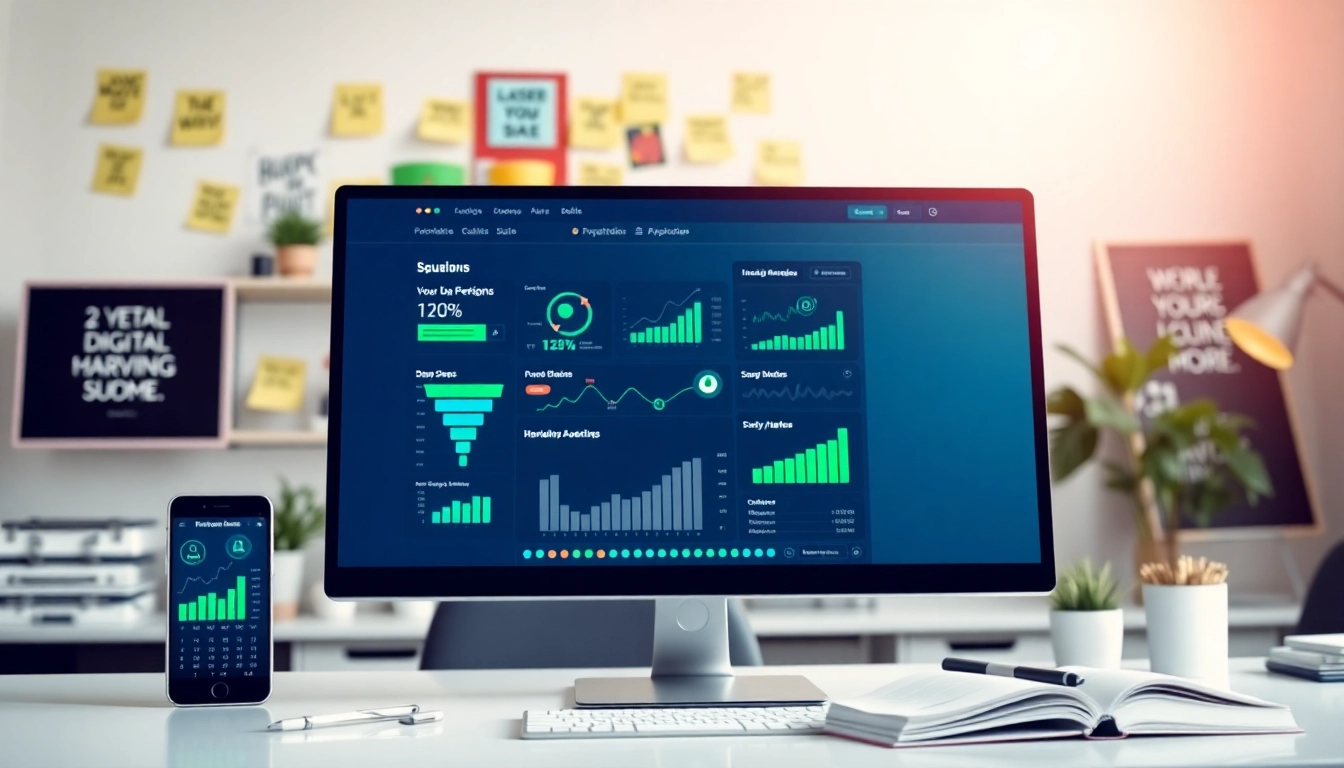Understanding AI Marketing Tools
What Are AI Marketing Tools?
AI marketing tools are advanced software solutions that leverage artificial intelligence to enhance various marketing processes and tasks. They streamline marketing operations, improve efficiency, and enable businesses to make data-driven decisions. These tools encompass a wide range of applications including content generation, customer segmentation, predictive analytics, sentiment analysis, and social media management. As more companies recognize the potential of AI to transform marketing strategies, the demand for these tools continues to grow.
The Benefits of AI in Marketing
The integration of AI into marketing strategies offers several advantages:
- Automation: AI tools automate repetitive tasks, allowing marketers to focus on strategic planning and creative initiatives.
- Data Analysis: They analyze vast amounts of data quickly, providing actionable insights that can enhance decision-making processes.
- Personalization: AI enables the creation of personalized marketing messages and content that resonate with individual consumer preferences.
- Improved Customer Engagement: Through predictive analytics, businesses can anticipate customer needs and improve interaction quality.
- Cost Efficiency: By automating tasks and improving targeting, AI tools can help reduce marketing costs and increase ROI.
How AI Marketing Tools Work
AI marketing tools typically function through machine learning algorithms and data processing techniques. Here’s how they generally operate:
- Data Collection: These tools gather data from various sources including CRM systems, social media, and website analytics.
- Data Processing: Collected data is processed and analyzed to identify patterns and trends.
- AI Model Training: The system trains algorithms using historical data to predict future behaviors or outcomes.
- Content Creation and Automation: Based on insights gained, AI tools can automate the creation of marketing assets, schedule postings, or personalize content delivery.
Top AI Marketing Tools for Businesses
Content Generation Tools
Content generation is one of the areas where AI truly shines. Tools like Jasper and Copy.ai utilize advanced natural language processing to create high-quality content tailored for various platforms. They can generate blog posts, social media content, emails, and even product descriptions based on a few prompts from users. These tools are equipped to not only replicate accepted writing styles but can also optimize content for SEO, improving visibility on search engines.
Social Media Management Tools
In social media marketing, tools such as Buffer and Hootsuite are invaluable. These platforms not only help manage multiple accounts from a single dashboard, but they also use AI to analyze engagement metrics, suggest optimal posting times, and improve target audience engagement. For example, Sprout Social offers AI features that can analyze the sentiment of customer interactions, providing brands with insights on public perception and engagement trends.
Email Marketing Automation
Email marketing remains a potent strategy for reaching customers. AI tools like Mailchimp and Sendinblue assist businesses in crafting personalized email campaigns by analyzing user behaviors and preferences. They can segment audiences dynamically, recommend content for individual recipients, and optimize delivery times to ensure high open and click-through rates. With predictive analytics, these tools forecast which types of content will resonate best with different segments of a customer base.
Implementing AI Marketing Tools Effectively
Integrating AI Tools into Your Strategy
For successful integration of AI marketing tools into a business’s marketing strategy, the following steps should be considered:
- Assess Needs: Analyze current marketing challenges and identify opportunities where AI can provide solutions.
- Choose the Right Tools: Select tools that align closely with your goals and target audience. Consider integrations and compatibility with existing systems.
- Train Your Team: Ensure your marketing team understands how to use these tools effectively, focusing on training and ongoing education.
- Continuous Monitoring: Regularly track and assess the performance of AI tools to ensure they are delivering the expected outcomes.
Measuring Performance and ROI
Measuring the effectiveness of AI marketing tools is crucial for understanding their value. Performance can be assessed through key performance indicators (KPIs) such as:
- Engagement Rates: Monitor likes, shares, comments, and overall engagement metrics.
- Conversion Rates: Track how many leads convert to customers after implementing AI-driven strategies.
- Customer Retention: Evaluate if there’s an increase in returning customer rates post-implementation.
- Cost Savings: Assess reductions in marketing spend against the effectiveness of campaigns.
Common Mistakes to Avoid
When implementing AI marketing tools, avoid these common pitfalls:
- Neglecting Data Quality: Ensure the data being utilized is clean and relevant. Poor data can lead to inaccurate insights and poor decision-making.
- Over-Reliance on Automation: While automation is beneficial, it should not replace human creativity and strategic thinking.
- Failure to Adapt: AI tools are constantly evolving. Stay updated with new features and enhancements to ensure optimal usage.
Future Trends in AI Marketing
Emerging Technologies
The future of AI marketing tools is interconnected with the advances in technologies such as machine learning, natural language processing, and predictive analytics. New tools will likely emerge that combine these technologies to offer even more precise targeting and personalization capabilities. Additionally, the integration of AR/VR with marketing is expected to enhance customer experiences significantly.
How AI Tools Are Evolving
AI marketing tools are evolving from simple automation platforms to sophisticated systems that provide deep insights and recommendations. The incorporation of advanced algorithms allows for predictive capabilities that will empower marketers to anticipate customer behavior more accurately. For instance, tools will soon offer features that analyze real-time data to optimize campaigns instantly as trends evolve.
Preparing for Future Changes
As the landscape of AI marketing continues to change, businesses should proactively prepare for these shifts by:
- Investing in Talent: Equip marketing teams with the skills needed to leverage AI effectively, which may include ongoing training in AI technologies.
- Being Open to Change: Foster a culture of experimentation where new tools and tactics can be tested and scaled.
- Staying Informed: Regularly update knowledge on emerging technologies and industry news to remain competitive.
Case Studies and Success Stories
Brands Successfully Using AI Marketing Tools
Many brands are leveraging AI marketing tools to enhance their strategies. For example, Netflix utilizes AI-driven algorithms to recommend content to users based on their viewing history, significantly enhancing user engagement and retention. Another example is Sephora, which applies AI to personalize shopping experiences on their website and through their mobile app, resulting in higher conversion rates.
Impact on Marketing Strategies
The impact of AI on marketing strategies is evident in improved targeting and customer engagement metrics. Brands using AI tools have reported higher efficiency in campaign execution, reduced customer acquisition costs, and enhanced customer loyalty. For instance, companies implementing AI for email marketing saw a 182% increase in click-through rates compared to traditional methods.
Lessons Learned
From the success stories, several lessons can be gleaned regarding the effective implementation of AI marketing tools:
- Start Small: Initiate AI projects on a small scale and evaluate results before scaling up.
- Focus on User Experience: Always prioritize the customer experience in AI initiatives to ensure engagement and satisfaction.
- Iterate and Improve: Treat AI as a learning process—continuously refine and adjust strategies based on performance data and market changes.














Leave a Reply